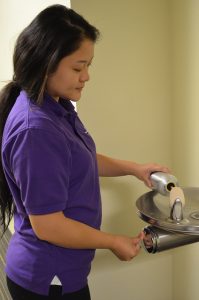Elizabeth Pulanco / Winonan

The amount of plastic water bottles placed in a landfill today will take up to 1,000 years to biodegrade. At Winona State University, faculty and students have worked to support sustainability and make a difference in removing the waste that plastic water bottles create.
As a way to promote the use of refillable water bottles, Jeanne Franz, a Winona State chemistry professor and director of the sustainability minor, has started the “Get ‘Caught’ Refilling Your Water Bottle” campaign.
“I wanted to do something when I saw all the freshmen were given refillable water bottles at the beginning of the year,” Franz said. “I thought I would do something to encourage them.”
To participate in the campaign, students send pictures of themselves or their friends filling up refillable water bottles at one of the many water fountains on campus. Then the students will post the picture on the Winona State sustainability minor Facebook page. The person whose photo receives the most “likes” will win a gift card to the Winona State Bookstore.
The campaign is also being used as a way to promote the use of the refillable water bottles that all incoming first-year students were given during orientation week. Wayne Wicka, the programming coordinator for Advising Services and Chris Veeder, Student Senate vice president, worked together on the creation of the grant that provided the students with the water bottles.
“I started talking with Chris while he was working on a sustainability initiative on campus,” Wicka said. “He and I got together and said, ‘Why don’t we do something collectively and suggest a foundation grant to give every incoming student at WSU a water bottle?’”
The Winona State Foundation was happy to set up the grant for the water bottles.
“The WSU foundation was very excited because they thought this would be a great way to help the students, and at the same time, increase awareness and visibility of all the good that the WSU Foundation does for its students,” Wicka said. “We put the WSU Foundation logo on the bottle, so that really helps them with their marketing initiative of all the good things they are doing on campus for the students.”
According to Wicka, the Winona State Foundation provided a grant of approximately $4,100.
Besides promoting the use of the water bottle, Franz is hoping the campaign will bring more attention to the sustainability minor.
“Students will come to me and say, ‘I just happened to hear about this minor but this is totally what I want to do. It would be nice if we learned about the minor earlier in our career,’” Franz said. “When people send in their picture to the page, they will get new information about the minor and how it fits into their studies.”
Franz is looking not only looking forward to seeing the students take action in using their water bottles, she is eager to see how students get creative with the photos.
“I am really excited to see people having their water bottles in creative places,” Franz said. “The added creativity of the students always delights me and I am excited to see the pictures come in from the students and the different locations they are using their reusable water bottles.”
First-year student Darling Vang received her water bottle at the beginning of the year and is proud to go to a school that supports and practices sustainability.
“You don’t think about how much plastic you use, but once you do, you feel good about supporting places that encourage recycling and refillable water bottles,” Vang said.
Moving forward, the sustainability will continue to support and take part in actions toward being more environmentally friendly.
“I will continue to work closely with Chris Veeder and Jeanne Franz to do whatever part I can to help fulfill the sustainability initiative at WSU,” Wicka said. “I just think it has been really neat that I have been able to be a part of the process to help make a difference on campus.”
With the introduction of the refillable water bottles and encouraging their use, Franz believes Winona State is working to achieve their goals of wanting to be more environmentally friendly.
“We welcome our freshmen to campus with an outdoor picnic during orientation week. One of the first things that the students saw, until this year, was, ‘Welcome to campus, here is your bottled water and your Styrofoam plate,’” Franz said. “This year, with the distribution of the reusable water bottles, students saw a change. Not only do we want to be an environmentally friendly campus, we are also taking concrete steps to make it happen.”
-By Elizabeth Pulanco








































